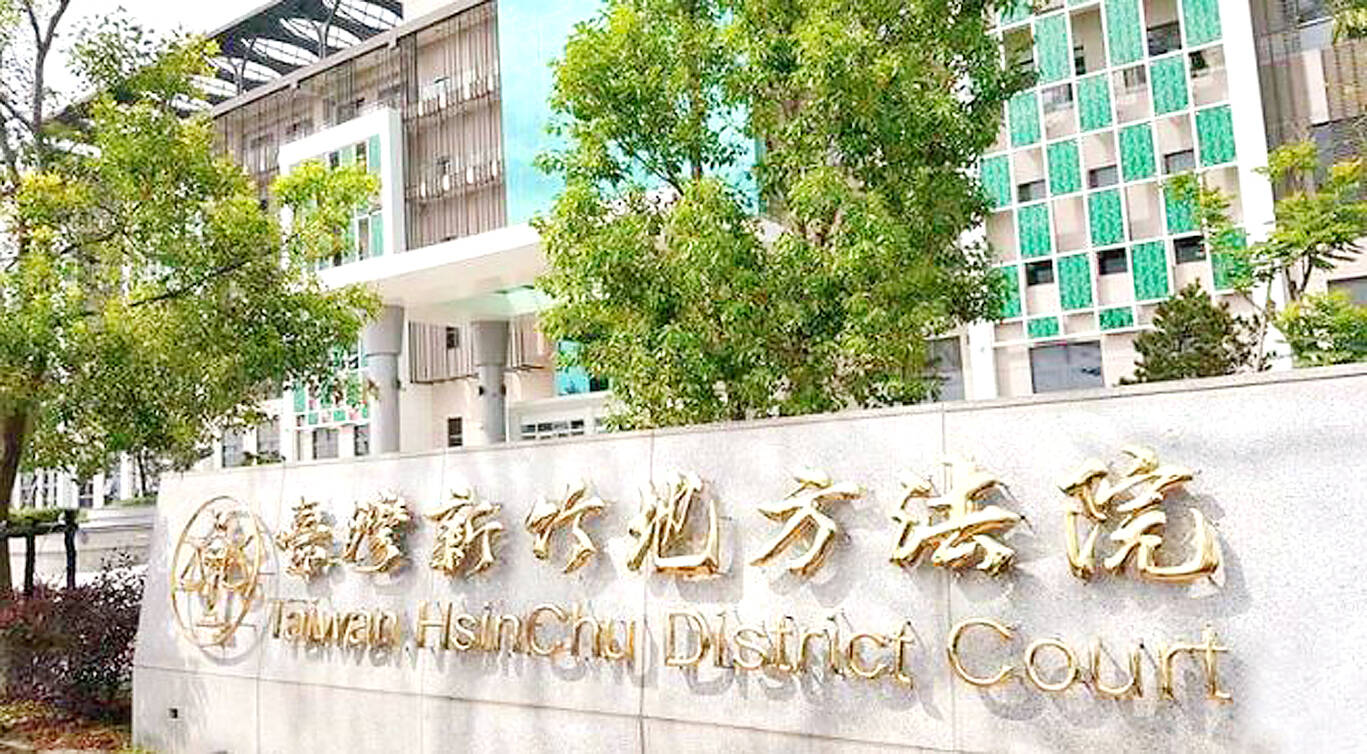A recent ruling by the Hsinchu District Court enabled a family to regain possession of a property from their son, who had evicted his parents from the place.
The man, surnamed Yeh (葉), was sued by his father, 98, who told the court he passed on the family house to his three adult sons by signing an agreement in 1997 witnessed by his wife and other family members.
The three sons were co-owners of the house in Hsinchu County, but the youngest son applied to a local government office to become the sole owner in August 2011 without knowledge of other two brothers by stating that his brothers had “agreed to gift” the house to him, the ruling said.

Photo: Tsai Chang-sheng, Taipei Times
The father was quoted by the court as saying that he and his wife were hospitalized in 2018, but Yeh made no contact with them, adding that his wife went home after her treatment in July 2021, but found the lock had been replaced, and Yeh did not let her in.
His wife had to live in a hut, which the family used as a temporary shelter while doing farm work, the father was quoted as saying.
When she tried to get back into the house a month later, his wife sustained a hand injury, the father was quoted as saying, adding that in November 2021, Yeh sent his parents to his elder brother’s home by taxi.
The father and his wife were in sorrow over their youngest son’s ungratefulness, and last year filed a case to revoke the house inheritance agreement due to “not fulfilling filial piety duties” to have ownership transfered to other family members, the father was quoted as saying.
The father passed away in January, while the litigation was still ongoing, and Yeh and his family did not attend his funeral, one of the brothers was quoted as saying.
In the ruling, the judge cited the Civil Code’s Article 416, which states that the donor of a property may revoke the gift if the recipient had acted toward them in ways failing to perform their duty, and Article 419, which says the donor may demand the return of the gift due to “unjust enrichment” by the recipient.
The court cited evidence provided by police officers regarding the incident in which the wife injured her hand.
Photographs showing the parents sitting in the hut and Yeh renting out the house’s second floor to be used as a warehouse were presented.
The court ruled there was sufficient evidence of Yeh refusing his obligations to care for his parents, and of “not fulfilling filial piety duties,” and cited the Civil Code to rule in favor of the father’s request to revoke the gifting of the house, imposing a mandate for Yeh to return the property to his father as the sole owner.
As the father had died before the ruling, the court granted the house’s ownership to all inheritors of the father, the ruling said.

A preclearance service to facilitate entry for people traveling to select airports in Japan would be available from Thursday next week to Feb. 25 at Taiwan Taoyuan International Airport, Taoyuan International Airport Corp (TIAC) said on Tuesday. The service was first made available to Taiwanese travelers throughout the winter vacation of 2024 and during the Lunar New Year holiday. In addition to flights to the Japanese cities of Hakodate, Asahikawa, Akita, Sendai, Niigata, Okayama, Takamatsu, Kumamoto and Kagoshima, the service would be available to travelers to Kobe and Oita. The service can be accessed by passengers of 15 flight routes operated by

GIVE AND TAKE: Blood demand continues to rise each year, while fewer young donors are available due to the nation’s falling birthrate, a doctor said Blood donors can redeem points earned from donations to obtain limited edition Formosan black bear travel mugs, the Kaohsiung Blood Center said yesterday, as it announced a goal of stocking 20,000 units of blood prior to the Lunar New Year. The last month of the lunar year is National Blood Donation Month, when local centers seek to stockpile blood for use during the Lunar New Year holiday. The blood demand in southern Taiwan — including Tainan and Kaohsiung, as well as Chiayi, Pingtung, Penghu and Taitung counties — is about 2,000 units per day, the center said. The donation campaign aims to boost

ENHANCING EFFICIENCY: The apron can accommodate 16 airplanes overnight at Taoyuan airport while work on the third runway continues, the transport minister said A new temporary overnight parking apron at Taiwan Taoyuan International Airport is to start operating on Friday next week to boost operational efficiency while the third runway is being constructed, the Ministry of Transportation and Communications said yesterday. The apron — one of the crucial projects in the construction of the third runway — can accommodate 16 aircraft overnight at the nation’s largest international airport, Minister of Transportation and Communications Chen Shih-kai (陳世凱) told reporters while inspecting the new facility yesterday morning. Aside from providing the airport operator with greater flexibility in aircraft parking during the third runway construction,

MORE FALL: An investigation into one of Xi’s key cronies, part of a broader ‘anti-corruption’ drive, indicates that he might have a deep distrust in the military, an expert said China’s latest military purge underscores systemic risks in its shift from collective leadership to sole rule under Chinese President Xi Jinping (習近平), and could disrupt its chain of command and military capabilities, a national security official said yesterday. If decisionmaking within the Chinese Communist Party has become “irrational” under one-man rule, the Taiwan Strait and the regional situation must be approached with extreme caution, given unforeseen risks, they added. The anonymous official made the remarks as China’s Central Military Commission Vice Chairman Zhang Youxia (張又俠) and Joint Staff Department Chief of Staff Liu Zhenli (劉振立) were reportedly being investigated for suspected “serious